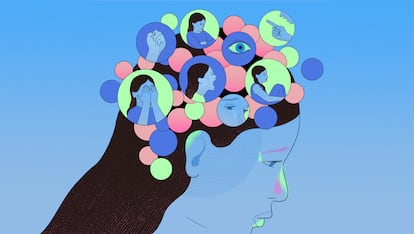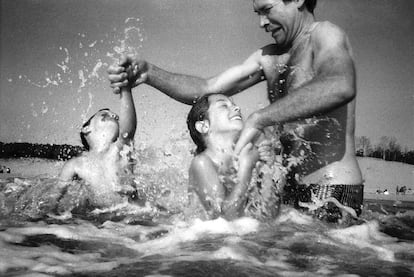Don’t yell at the child: Neuroscience shows us how to educate in the 21st century
Regular punishments and threats not only don’t work, but actually damage the brain of minors

There is a woman in France who is concerned about the mental health of the children. She has a message she takes wherever she goes: we need an educational revolution and to change the way we treat children. Recent neuroscientific advances indicate that punishing, yelling and threatening not only do not work, but actually end up affecting the brain of minors, causing permanent changes that, in the long run, generate problems such as depression or anxiety. Thus, it is critical that many modify their relationship with kids.
This is a widespread belief. Opinions abound on this matter; everyone has their own. As much as we adore them, sometimes it is hard to refrain from shouting; self-control is not an easy thing. Meanwhile, the gurus of the so-called “positive education” have millions of followers on social media, although some are not aware that this sector is experiencing a scientific boom.
The French woman with a message is Catherine Gueguen, who has been a pediatrician for 28 years at the Franco Britannique - Levallois Perret Hospital in Paris. As part of her discourse, Gueguen includes global data from UNICEF: four out of five children are subjected to a verbal or physically violent education. A staggering 80% receive some kind of corporal punishment. She also shares the results of a recent survey (from October 2022), carried out in France, in which 79% of 1,314 heads of family admitted using psychological violence when educating their children. “You may think that violence is not widespread, but trust me, it is,” she says. “As a pediatrician, I have heard many parents tell me that when they lose their temper, they punish, threaten or even hit their children.”
Gueguen was 44 years old in 1994, when a book that revolutionized what we knew about our minds was published: Descartes’ Error: Emotion, Reason and the Human Brain, by Portuguese neurologist Antonio Damasio, recipient of the 2005 Prince of Asturias Technical and Scientific Research Award. In it, the neuroresearcher gave our emotions and feelings the role they deserve in our behavior. “We used to consider it unimportant,” says Damasio. “And yet, emotions are essential. I wanted to give them their appropriate role; they are what make us human.”
The message of the book is that Descartes was wrong when he stated “I think, therefore I am.” In Damasio’s view, the correct statement should be “I feel, therefore I think.” He described the functioning of the prefrontal cortex, an area of gray matter several millimeters thick that is above the eye sockets, which connects different parts of the brain with others that determine our motor and psychological response. He showed that emotions and feelings play a key role in our rationality. To arrive at this conclusion, he measured the magnetic fields that produce the electrical currents that pass through our minds.

In the past, this type of research could only be carried out by opening a skull with a scalpel. However, with the last two decades of advances in the material that helps to study this crucial organ, the information available has increased significantly. From different parts of the world — United States, Canada, northern Europe, Australia, China — neuroscientific studies on some aspect of the plasticity of our brain are published every week. Here, we will focus on those that deal with the effects of the so-called “negative education” (in which minors are constant victims of some type of betrayal of the trust they place in their caregivers) on the brain of the child. To be clear: we are talking about abuse, understood as verbal attacks that seek to humiliate, denigrate or cause fear to the child, or emotional abuse that causes feelings of shame or guilt, in addition to other forms of physical abuse such as beatings.
In its early years, neuroscience studied the most serious cases; orphaned children or victims of severe abuse. “But, little by little, we have been getting closer to more common families,” says Dutch neuroresearcher Sandra Thijssen, an expert in child development at the Institute of Behavioral Sciences of Radboud University.
In 2018, the American Academy of Pediatrics published a list of recommendations warning of the dangers of a harsh upbringing. There is a network of American universities that carry out this type of research and share their results to increase the knowledge. Martin Teicher, professor of psychiatry at Harvard University and director of the Developmental Biopsychiatry Research Program at McLean Hospital in Boston, is one of the pioneers of this network. He tells EL PAÍS that, in his opinion, learning about how children and teenagers should be treated should be included in the secondary school curriculum, so that young people can acquire some notions of the real risks that minors face.
Neuroscientific studies indicate that when minors who are frequently verbally abused reach adolescence, “they are less creative and curious, they are less capable of acquiring new knowledge and more prone to experience sadness and depression,” says David Bueno i Torrens, a biologist specialized in genetics and neuroscience and director of the first chair in neuroeducation in Spain, at the University of Barcelona. The same areas of the brain are activated, explains the biologist; what changes is the relationship between the different areas. “With negative education, the brain amygdala becomes more reactive to negative emotions, and the area that manages emotions, the prefrontal, becomes less capable of managing anxiety and stress,” he continues. Those minors, more apathetic, have a harder time finding motivation. In their search for stimuli, they may fall into drug use.
Australian psychiatrist and psychologist Sarah Whittle, from the Melbourne Neuropsychiatry Centre, found that growing up in a poor or disadvantaged neighborhood causes changes in the children’s cognitive function and mental health. She surveyed 7,500 children from different social classes and suggested that it would be useful if both their parents and their teachers received support so they understand that smiling frequently at children and making them feel loved when they are angry or throwing a tantrum can compensate for other negative aspects of their living environment.
What happens when we punish?
What goes on in the brain of a minor that is being punished? As psychologist, doctor in education and author Rafa Guerrero has written, the lower areas of the brain, the ones that have to do with survival, activate in the child. Large doses of adrenaline and cortisol are released, prompting action and preventing thinking. In other words, punishment blindly invites revenge. “Since the part of the brain basement (instincts and emotions) is hyperactivated, it is difficult to connect with the brain attic (critical thinking, reasoning, executive functions, etcetera). We cannot be aware or think about what happened, and we only obey our most instinctive and emotional part.” There is no real learning; for this, love, respect, patience and kindness are essential.
But if we cannot punish our children, how can we make them understand the rules that we are trying to teach them? “That’s the key,” says Guerrero. There will always be people who maintain that some spanking, or locking a two-year-old child in a room, will help improve their behavior, says the French psychoanalyst Caroline Godman. However, neuroscience points in a different direction. Neuropsychologist and expert in education Álvaro Bilbao explains that between the extremely lenient parents who never establish any boundaries and the traditional heavy-handed parents there is a large intermediate group that does sets firm limits, or at least tries to, helping minors gain self-confidence.
Gueguen, thrilled about the scientific progress that has been taking place in recent years, took a while to find out about Damasio’s book; but after reading it she realized that, given the evidence that humans are influenced by feelings, it was imperative that steps be taken so that many parents have a healthier relationship with their own children. She is concerned about what she calls “the unconditional fidelity of children towards their parents.” In other words, parents that were educated harshly or with signs of abuse often replicate that model. “Doubting your own parents can be very painful,” says Gueguen. “Many appropriate phrases like ‘this’ll teach you,’ ‘this is how you’ll get better,’ as they are punished.”
For five years, the pediatrician has been training childhood professionals such as doctors, psychologists, educators and midwives, and directs a diploma program on parenting support at the Sorbonne. In 2018 she published Heureux d’apprendre à l’école: Comment les neurosciences affectives et sociales peuvent changer l’éducation (Happy to learn at school: How affective and social neuroscience can change education). Gueguen explains what is expected of a parent who tries to educate their child the right way: they are, above all, persons who are empathetic and kind towards themselves; who are connected with their own emotions, know how to express them and talk about them with their child. “They know that raising a child is a source of happiness, but it can also be extremely difficult; that they will make mistakes, and that seeing your parents acknowledge them and apologize is very educational for the child.” When parents develop this self-kindness, they know how to pass it on to their child and they, in turn, “flourish,” she says.
An appeal
Gueguen was among the experts who were paying close attention when the World Health Organization and UNICEF published an appeal to governments asking for the implementation of a minimum of five parenting support sessions for parents or guardians of minors. Unfortunately, the appeal was published in the midst of the post-Covid-19 wave, and it was not as promoted as expected. They were based on “more than 200 trials” published in the last 20 years, and maintain that providing educational assistance to parents when they take their minors to get vaccinated would have immensely positive effects on the mental health of the kids. “We believe it because it has been proven,” says Benjamin Perks, a UNICEF deputy representative. “We have the data right under our noses. It is time to implement these support programs. The damage caused by these practices is widespread, and the data shows that it is possible to prevent it. In the US and Europe, approximately €1.2 trillion [$1.3 trillion] are spent to deal with this problem. For a fraction of that, we could infinitely improve the situation,” concludes Perks.
“Parents and educators need to be accompanied throughout their lives and professions,” insists Gueguen. They need to be understood, she says, not blamed, and to know that taking care of a minor can be very difficult and very demanding, and that they will often make mistakes and need support.
What does neurologist Antonio Damasio, the man who opened our eyes, think the next step in the investigation should be? “The awareness of ourselves and others is very much related to our emotions, not our intellect,” he says. “And I think what we should start to investigate is: what role does awareness really play in our brain?”
Sign up for our weekly newsletter to get more English-language news coverage from EL PAÍS USA Edition
Tu suscripción se está usando en otro dispositivo
¿Quieres añadir otro usuario a tu suscripción?
Si continúas leyendo en este dispositivo, no se podrá leer en el otro.
FlechaTu suscripción se está usando en otro dispositivo y solo puedes acceder a EL PAÍS desde un dispositivo a la vez.
Si quieres compartir tu cuenta, cambia tu suscripción a la modalidad Premium, así podrás añadir otro usuario. Cada uno accederá con su propia cuenta de email, lo que os permitirá personalizar vuestra experiencia en EL PAÍS.
¿Tienes una suscripción de empresa? Accede aquí para contratar más cuentas.
En el caso de no saber quién está usando tu cuenta, te recomendamos cambiar tu contraseña aquí.
Si decides continuar compartiendo tu cuenta, este mensaje se mostrará en tu dispositivo y en el de la otra persona que está usando tu cuenta de forma indefinida, afectando a tu experiencia de lectura. Puedes consultar aquí los términos y condiciones de la suscripción digital.









































